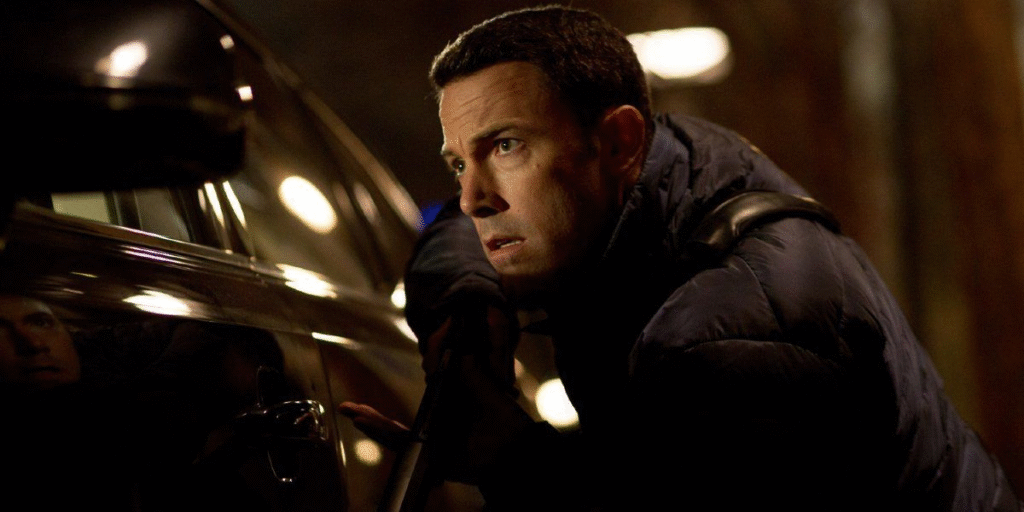In a cinematic landscape flooded with formulaic sequels, Accountant 2 crashes through the noise like a calculated storm — bold, unapologetic, and unapologetically different. Ben Affleck returns with fierce precision as Christian Wolff, the high-functioning autistic accountant who’s not just balancing books — he’s dodging bullets, decoding conspiracies, and dismantling assumptions with the cold logic of a mind the world barely comprehends.
But make no mistake — Accountant 2 is far more than an action-packed follow-up. It’s a cultural counterpunch. At a time when autism is too often misunderstood — even maligned, as in U.S. Health Secretary Robert F. Kennedy Jr.’s recent claim that autistic children “will never pay taxes, play baseball, or write poetry” — this film hits back with a different message: that neurodiversity is not a flaw, but a force.
Through gripping narrative, powerhouse performances, and groundbreaking representation, Accountant 2 reframes what it means to live — and thrive — on the spectrum. Let’s dive into the story, the symbolism, and why this sequel isn’t just worth watching — it’s worth talking about.

Accountant 2 Plot Overview
In Accountant 2, the stakes are higher, the enemies more elusive, and Christian Wolff’s world more complex than ever. Still operating from the shadows, Wolff continues his dual life — forensic accountant by day, covert operative by night — meticulously laundering money for global criminal empires. But this time, the ledger isn’t so clean. What begins as a routine assignment soon spirals into a tangled web of corruption, cyber warfare, and a government cover-up that could cost him everything.
Unlike in the first installment, Christian is no longer working alone. Accountant 2 introduces a compelling new character: Justine, a non-verbal autistic woman whose intelligence and resilience shine through her method of communication — a keyboard connected to a voice synthesizer. Justine is not only his partner but also a mirror to his past, challenging him to confront parts of himself he has long suppressed.
Together, they form an unlikely alliance with a brilliant group of autistic teenage hackers housed within a revolutionary think tank known as Harbor NeuroScience. This organization isn’t just a background setting — it’s a symbol of the emerging power of neurodivergent minds. The group assists Wolff in high-stakes missions that involve hacking traffic infrastructure, intercepting encrypted transmissions, and exposing classified data — all while staying one step ahead of law enforcement and a mysterious new enemy who always seems to be watching.
As the plot of Accountant 2 unfolds, the action is relentless — from rooftop chases and silent takedowns to intricate cyber sequences that rival the best techno-thrillers. But beneath the adrenaline lies something deeper: a psychological portrait of a man wrestling with his identity. Christian’s autism is not just a character trait — it’s his superpower and his Achilles’ heel. He uses it to decode patterns others can’t see, to stay calm under pressure, and to see through deception. Yet, at the same time, he struggles with intimacy, trust, and the isolating walls of a world that never quite makes room for difference.
Through flashbacks and emotional confrontations, Accountant 2 offers a raw, unfiltered glimpse into Christian’s formative years, his complicated relationship with his brother, and the trauma that shaped his view of justice. The film doesn’t shy away from his challenges — instead, it places them at the core of his strength.
In short, Accountant 2 is not just an action movie — it’s a layered narrative where bullets meet brains, and where survival depends not on brute force, but on the brilliance of a mind that sees the world through a different lens.
A New Kind of Representation
What makes Accountant 2 more than just a slick action sequel is its bold redefinition of how autism is portrayed on screen. In an industry often criticized for flattening neurodivergent characters into one-dimensional tropes — the “awkward genius,” the “emotionless robot,” or the “isolated recluse” — this film refuses to follow the script. Instead, Accountant 2 embraces nuance, complexity, and strength, offering a more realistic, empowering, and emotionally rich representation of autism.
Extraordinary Analytical Abilities
Christian Wolff’s brilliance isn’t exaggerated — it’s calculated. In Accountant 2, we see the true scope of his analytical prowess. His mind doesn’t just process numbers — it sees them as living systems, interwoven with patterns, probabilities, and hidden logic. Whether he’s deconstructing international money laundering schemes, breaking down military intelligence files, or solving multilayered mathematical riddles in seconds, Christian operates with the focus and precision of a machine, but the intuition of a master chess player. His abilities underscore a truth too often ignored: that many autistic individuals possess extraordinary strengths in pattern recognition, critical thinking, and systemic analysis.
Literal Thinking and Logic-Based Decisions
Another standout element in Accountant 2 is Christian’s consistent reliance on logic over emotion. In a world clouded by personal agendas and emotional impulses, his literal thinking cuts through the noise. He interprets situations exactly as they are, not as they are meant to be perceived. This can make his responses seem blunt or socially unorthodox, but more often than not, it allows him to navigate crises with cold clarity. Whether choosing the most efficient escape route or determining who to trust, his decisions—though often surprising—prove vital to survival. This portrayal reminds audiences that what may seem like social ‘quirks’ are, in many cases, highly evolved cognitive strategies.

Heightened Sensory Awareness
Accountant 2 doesn’t just tell us about Christian’s sensory differences — it shows them. The film uses cinematic techniques like sound distortion and visual sharpness to immerse viewers in his heightened sensory world. In tense scenes, Christian’s acute hearing picks up faint whispers behind closed doors or the subtle click of a trigger being pulled in the next room. His visual acuity allows him to spot inconsistencies in spreadsheets, facial expressions, and architectural blueprints that others would miss entirely. These sensory traits, commonly experienced by many on the autism spectrum, are framed not as burdens but as strategic advantages — critical to both plot and character development.
In a genre often dominated by physical strength and explosive action, Accountant 2 introduces a new kind of hero — one whose power lies in focus, precision, and an extraordinary mind. It doesn’t glorify autism or reduce it to a gimmick. Instead, it respectfully portrays it as a lived experience with its own strengths and struggles, embodied in a character who refuses to be defined by society’s expectations.
This is representation done right. Authentic. Intelligent. And long overdue.
Why Representation Matters
In an era where diversity and inclusion are increasingly part of the public conversation, Accountant 2 takes a vital step forward by embracing not just the idea of representation, but the responsibility of doing it right. One of the film’s most groundbreaking decisions lies not in its plot twists or explosive set pieces, but in its casting — specifically, its choice to feature actual autistic actors in many of the supporting roles.
This is not just a symbolic gesture. It’s a transformative move.
Director Gavin O’Connor made it clear from the outset: he didn’t want to simply represent autism — he wanted autistic people to shape the way their stories are told. During production, these actors were invited into the creative process. Their real-life experiences — how they communicate, think, feel, and engage with the world — were woven directly into the script and character development. As a result, their portrayals feel lived-in, organic, and emotionally true in ways that traditional Hollywood performances often fall short.
The impact is striking. In Accountant 2, you don’t just see autistic characters on screen — you feel their presence. The team of hackers at Harbor NeuroScience, for example, isn’t written as quirky sidekicks or comedic relief. They’re brilliant, vital, and treated with the respect their intelligence commands. Justine, Christian’s non-verbal ally, is portrayed not as a victim or burden, but as a fully realized character with agency, insight, and power. Her method of communication through assistive technology is shown not as a limitation, but as a different mode of expression — one just as rich and nuanced as speech.
By casting autistic actors, Accountant 2 does something few big-budget films have dared to do: it hands the mic to the very people whose voices are so often left out of the conversation. This isn’t just about checking boxes — it’s about authenticity, integrity, and the undeniable fact that real representation changes perception. When audiences see neurodivergent characters portrayed with depth and dignity — and when those portrayals come from people who live that reality — the result is powerful. It chips away at stigma. It creates empathy. It opens minds.
For the autistic community, this kind of visibility is more than meaningful — it’s monumental. And for Hollywood, Accountant 2 sets a new bar, proving that inclusion doesn’t dilute storytelling — it strengthens it.
Ben Affleck’s Commitment
Affleck’s performance doesn’t just feel studied — it feels lived-in. He went beyond memorizing lines and choreographing fight scenes. He spent time with autistic individuals and their families, listening to their stories and learning about their world.
In an interview with the Associated Press, Affleck shared:
“Working on this character made me realize autism isn’t a limitation — it’s just a different way of thinking. There’s humor, warmth, and incredible brilliance in so many autistic individuals.”
His thoughtful portrayal gives Christian Wolff the quiet strength and depth that make the character so compelling.
Why This Movie Matters Now
Robert F. Kennedy Jr.’s recent statement sparked widespread outrage:
“Many children diagnosed with autism will never pay taxes, play baseball, or write poetry.”
In that context, The Accountant 2 feels almost like a rebuttal. It not only refutes that kind of dismissive rhetoric — it flips the narrative entirely. The film shows autistic individuals contributing in remarkable, even heroic, ways. Director O’Connor didn’t mince words when he responded, calling RFK Jr.’s remarks “ignorant and harmful.”
Strengths and Weaknesses
What Works:
✅ Empowering Representation – Autism is not portrayed as a disability but as a different ability.
✅ Balanced Tone – Despite heavy themes, the film weaves in humor and levity.
✅ Authentic Casting – Autistic actors bring honesty and depth to their roles.
What Falls Short:
❌ Predictable Story Arcs – As a sequel, it struggles at times to surprise.
❌ Over-the-Top Action – Some of the fight scenes overshadow the emotional beats.
Why You Should Watch
The Accountant 2 is more than bullets and brainpower — it’s a statement. It doesn’t try to romanticize or simplify autism. Instead, it insists on recognizing the value of minds that see the world differently. The film makes one thing clear:
Autism isn’t a barrier — it’s another lens to view the world.
Whether you come for the action or stay for the message, this is a film that deserves your attention.
Rating: ⭐⭐⭐⭐ (4 out of 5 stars)
What did you think? Did the film change your perspective on autism in any way? Let us know in the comments.
Read More : George Santos: Shocking Truth Behind the Mask
